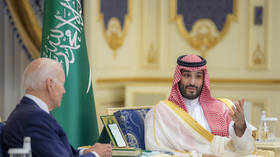US Middle East ‘normalization’ plan rejects reality

From the disastrous Afghanistan withdrawal to Chinese-brokered peace between Saudi Arabia and Iran, the US administration of President Joe Biden has been overseeing an era of declining American power across West Asia. In the midst of this fall from grace as the Middle East’s hegemon, Washington’s obsession with achieving a Saudi-Israeli normalization deal demonstrates a disconnect from reality and proves that optics are more important than tangible policy positions.
US National Security Advisor Jake Sulivan made it publicly clear last Tuesday that a normalization deal between Saudi Arabia and Israel, which Washington is currently working on, is still far from being achieved. This announcement followed speculation in American media that such a deal could be imminent. For those who have been paying attention to the region’s politics, however, it couldn’t be more clear how arduous a task achieving such a deal would be.
Looking at the deal through an American lens, it is clear what a diplomatic achievement of this nature would mean for the legacy of a US president’s administration. It would go down as a significant victory for the head of state, Joe Biden. It would also provide a great photo-op in the event that it happens; one that could be used to demonstrate the government’s strength in the 2024 elections. It could be calculated by the Democratic Party administration that prioritizing such a deal could make up for the president’s previous failures regarding the American role in the Middle East.
However, objectively speaking, achieving Saudi-Israeli rapprochement will mean overcoming countless hurdles on all sides and may end up doing more harm than good regionally. This is despite the Biden administration’s promises that it would boost regional security and stability. Yet with the recent announcement that the BRICS bloc will be adding Iran and Saudi Arabia as members come January 2024, after Tehran and Riyadh re-established ties under Beijing’s auspices, such a deal could open new regional wounds and run contrary to the vision set forth by Saudi Crown Prince Mohammed Bin Salman.
When the Trump administration managed to rope Bahrain, Sudan and Morocco into a normalization agreement between the United Arab Emirates (UAE) and Israel (the Abraham Accords), the initiative came from the UAE itself, at a time when Abu Dhabi had clearly decided to go ahead with the move. There was no real struggle to convince the UAE to go ahead with normalizing ties with the Israelis. In fact, in the cases of Morocco and Sudan, the Emiratis helped place pressure on those nations to accept normalization deals.
Saudi Arabia, despite having maintained close ties with the Trump administration – the first foreign visit of US President Donald Trump was to Riyadh – shied away from signing onto the normalization deal with the Israelis, likely because such a move would be more challenging for a country like Saudi Arabia domestically than for the likes of neighboring Bahrain or the UAE.
As of now, Saudi-US relations under the Biden administrations have been far from cordial, and when the American president made his first trip to the Saudi kingdom last year, he was made to appear as an afterthought. When Joe Biden confronted Mohammed Bin Salman over the infamous killing of Saudi journalist Jamal Khashoggi, the Crown Prince allegedly fired back by bringing up the lack of action taken over the killing of American veteran journalist, Shireen Abu Akleh, by an Israeli soldier. Mohammed Bin Salman even told The Atlantic monthly that he didn’t care if Biden misunderstood him. Saudi Arabia has also ignored calls from the US to alter oil production.
If the Biden administration is to convince Saudi Arabia to sign onto a normalization deal, concessions must first be granted. Riyadh reportedly seeks a civil nuclear program and a US security pact that could drag Washington into war in the event that the kingdom comes under attack. Such preconditions present a litany of hurdles for the American government.
Then there is Israel, which under any other government than the current far-right coalition of Prime Minister Benjamin Netanyahu would easily be able to get away with signing such a deal. However, Netanyahu has reportedly been requested to make some kind of concession towards the Palestinians in order to make the UAE deal go ahead. The government that Benjamin Netanyahu now heads is entirely different to the one he led in 2019, and his coalition depends on the support of the extremist Religious Zionism (RZ) alliance. RZ even pushes back against the idea of security coordination with the Palestinian Authority (PA), based in Ramallah, despite the fact that this policy benefits Israeli security. RZ stated clearly, from the time of the 2022 national election, that one of its goals was to annex the West Bank and the most likely concession that the US will ask of Tel Aviv is to again promise that it will steer away from doing so.
When it comes to the Palestinians, there is also the uncontrollable factor of a major escalation between the Palestinian armed factions and the Israeli military, over Israeli provocations at Al-Aqsa Mosque. Saleh Al-Arouri, the deputy head of the political bureau of Hamas, recently told al-Mayadeen that in the event of any senior leader being targeted, there will be regional war. This is at a time when pressure is growing on the Israeli government to carry out an attack on Hamas leaders in response to numerous attacks against Israeli settlers and soldiers in the West Bank. This, on top of the recent tensions at the Lebanese border with Hezbollah, all make for a potentially explosive situation, under which a Saudi-Israeli deal would look awful for Mohammed Bin Salman.
There is additionally the issue of what a Saudi-Israeli deal may do to Iranian-Saudi relations and their recent re-establishment of ties. As Saudi Arabia includes within it two of the holiest sites in the Islamic faith, Mecca and Medina, its decision to normalize ties with Israel will carry massive significance throughout the Muslim world. Such a move would prove it impossible for Tehran to remain neutral on the issue and it is very likely that the Iranians would reverse their decision to maintain ties with the Saudis. This means that if the Saudis are to sign a normalization deal with Israel, they have to know that this will undermine China’s diplomatic breakthrough and could end up presenting greater security concerns if they again find themselves competing so heavily for influence regionally with Iran. There is also cause for concern when it comes to Jordan’s reaction, which may see such a deal as a threat to its custodianship over the Holy sites in the Old City of Jerusalem, and feel that Saudi Arabia is encroaching upon its territory.
If the US administration had a serious approach to its Middle East policy, it would realize the dramatic shift that has occurred regionally and that its traditional allies have agendas that are no longer congruent with the old American status quo approach. It would seem, from observing the rhetoric and actions of Washington, that the current US government is in denial and cannot grasp that the days when it could boss around every country in West Asia are long gone. It will take pragmatic thinking to revive the US position in the long run, and one thing is for sure, a Saudi-Israeli normalization deal doesn’t make sense for any country at this time.
The statements, views and opinions expressed in this column are solely those of the author and do not necessarily represent those of RT.















